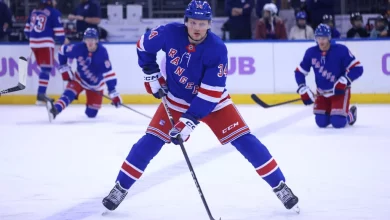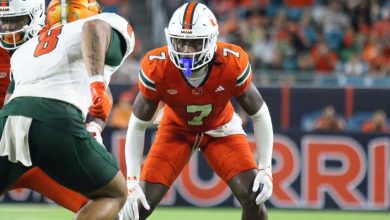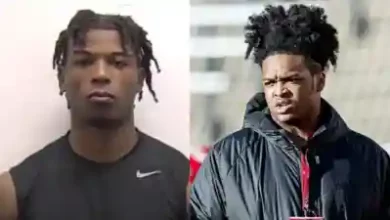Nico Iamaleava’s public renegotiation raises a significant dilemma in college football, highlighting the complexities of NIL deals and player contracts.

The rise of NIL (Name, Image, and Likeness) deals in college sports has fundamentally changed the landscape of college athletics, and no case exemplifies the increasing complexity of this new era better than that of Nico Iamaleava. Iamaleava, a highly-rated quarterback from California, had committed to the University of Tennessee, and the expectations surrounding his college football career were enormous. His skills on the field were undeniable, with some calling him a future NFL prospect. However, what has made his case especially fascinating—and controversial—is the public renegotiation of his NIL deal, which has created a massive dilemma for college football.
Before diving into the specifics of this dilemma, it’s essential to understand the background of the situation, the rise of NIL deals in college sports, and how Iamaleava’s renegotiation fits into this new dynamic. The implications of this event reach far beyond just one player or one university. It touches on the future of college athletics, the growing influence of money in recruitment, and the inherent challenges that come with allowing athletes to profit off their names.
The Rise of NIL in College Football
In recent years, the concept of college athletes earning money from their names, images, and likenesses has been revolutionary. Prior to 2021, NCAA rules prohibited athletes from profiting off their own identity, but with pressure from legal challenges, public opinion, and the changing dynamics of college sports, the NCAA finally reversed its stance. The NIL rule change allowed athletes to enter into endorsement deals, sign contracts with brands, and profit from their image while still participating in college athletics.
The introduction of NIL deals has been transformative, especially for football players in programs with high national visibility. A player’s potential earning power has skyrocketed, especially for those playing at elite programs like Alabama, Ohio State, and, in Iamaleava’s case, Tennessee. But this shift hasn’t come without significant complications. The lack of clear regulations around NIL, the varying state laws, and the role of boosters in influencing recruitment have created a complex and sometimes chaotic situation.
NIL deals have raised numerous questions: How should compensation be structured? What are the limits, if any, on how much an athlete can earn? Can these deals lead to potential abuse, where athletes are more focused on money than education and the sport itself? The public renegotiation of Iamaleava’s NIL deal has forced these questions to the forefront in ways few had anticipated.
The Case of Nico Iamaleava: A Star in the Making
Ilamaleava was one of the most sought-after quarterbacks in the 2023 recruiting class. Standing at 6’5” and possessing a powerful arm, he was widely considered one of the top prospects in the country. His potential to dominate college football and eventually play in the NFL led to intense recruiting battles, and Tennessee ultimately secured his commitment.
However, what made Iamaleava’s situation unique was not just his physical talent but the size of his NIL deal. Upon committing to Tennessee, rumors swirled about the enormous NIL package he had reportedly signed. While specific details of the deal remain confidential, it’s been widely speculated that his NIL compensation was among the highest in college football at the time. The deal involved not only endorsements but also potential business ventures, appearances, and sponsorships.
For a player of Iamaleava’s caliber, this kind of compensation is not entirely surprising. Elite recruits, especially in high-profile sports like football, have become valuable commodities. Schools are willing to invest large sums of money to attract top-tier talent. However, as is often the case in these deals, the public nature of Iamaleava’s agreement has led to scrutiny. In a public statement that shocked many, Iamaleava and his representatives announced that they were seeking a renegotiation of the terms of the deal. The timing of the renegotiation, coupled with the high-profile nature of his recruitment, caused a stir that has only intensified as it played out in the public eye.
The Public Renegotiation: The Dilemma for College Football
The fact that Iamaleava’s NIL deal renegotiation was made public has caused waves throughout college football. On the surface, the renegotiation might seem like a natural part of the evolving nature of NIL deals. After all, many athletes negotiate contracts in professional sports, so why should college athletes not do the same? The key difference, however, lies in the structure and the inherent conflicts that arise in the amateur model of college athletics.
1. Ethical Dilemmas in Recruiting
One of the first issues this public renegotiation highlights is the blurred line between amateurism and professional sports. College football, while still part of the larger NCAA structure, has become increasingly professionalized, particularly as top recruits are given opportunities to sign NIL deals worth millions of dollars. The amount of money on the table for players like Iamaleava raises the question: Are we witnessing the professionalization of college athletics?
Some critics argue that this has led to a situation where recruits are more focused on financial compensation than the traditional aspects of college sports, such as the pursuit of a championship or the opportunity to play in a prestigious conference. It has been suggested that Iamaleava’s renegotiation, coming on the heels of his signing with Tennessee, demonstrates how the focus of college football recruitment may be shifting away from what happens on the field to what happens off of it—namely, the financial incentives tied to these athletes.
2. The Role of Boosters and Their Influence
Another complication is the role that boosters play in NIL deals. Many boosters have become key players in the recruitment process, using their wealth to funnel money into NIL deals for athletes. While the NCAA technically prohibits boosters from directly influencing a player’s recruitment, the lines are often blurred. It is well-known that large sums of money are being promised to recruits through NIL opportunities, but tracking the exact flow of money is difficult due to the decentralized nature of NIL agreements.
With Iamaleava’s public renegotiation, questions arise about how much influence boosters may have had in shaping his contract. Is the renegotiation an indication that Iamaleava’s deal was not being fulfilled as expected, or does it point to larger systemic issues involving booster promises and recruitment promises that were made prior to his commitment? The transparency—or lack thereof—around these deals fuels suspicions and concerns about fairness in the recruiting process.
3. The Impact on Future NIL Deals
Iamaleava’s renegotiation has set a significant precedent for future NIL negotiations. His deal, reportedly worth millions, was seen as the gold standard for NIL contracts in college football. However, the fact that a public renegotiation is taking place could lead to increased pressure on other programs to offer similar deals to top recruits in order to remain competitive. This could create a situation where NIL contracts become even more inflated, leading to an arms race among colleges to outbid one another for top prospects.
This, in turn, raises questions about the sustainability of these deals. If players like Iamaleava are constantly renegotiating their deals, does this create a system in which athletes are never fully satisfied with their compensation? Could it potentially lead to a revolving door of contracts, with athletes jumping from one lucrative deal to the next without the same long-term commitment to their teams? Such instability in NIL contracts could have serious ramifications for the future of college football, especially when it comes to roster consistency and long-term team building.
4. Legal and Regulatory Issues
Finally, Iamaleava’s situation shines a light on the legal and regulatory complexities of NIL. While the NCAA has allowed NIL deals to happen, the governing body has not fully outlined clear rules on how these deals should operate. Each state has its own laws regarding NIL, and there is no uniform standard for how schools or athletes should engage with these deals. The renegotiation of Iamaleava’s contract only further complicates the legal landscape, as schools, agents, and boosters work within these grey areas.
If a player like Iamaleava can renegotiate his contract in the public eye, what does that say about the future of NIL contracts? Will other athletes attempt to leverage similar strategies? Could this lead to legal disputes about the terms of NIL contracts, especially if athletes and schools disagree about how deals should be structured or what they entail?
What Does This Mean for College Football?
Nico Iamaleava’s public renegotiation has placed a spotlight on the complexities of NIL deals and the emerging power dynamics in college football. It has raised ethical questions about the balance of power between athletes, schools, and boosters. Furthermore, it has shed light on the legal and regulatory uncertainty surrounding NIL agreements and how this uncertainty could shape the future of college sports.
In the immediate term, Iamaleava’s case is likely to serve as a cautionary tale for other college athletes and programs involved in NIL agreements. Schools will need to find ways to balance competitive recruiting with the financial realities of NIL deals. Similarly, athletes will need to consider the long-term implications of their deals, not just in terms of financial gain but also in terms of their relationships with the schools, fans, and teammates they choose.
Ultimately, the Iamaleava situation is part of a larger shift in college football and college sports as a whole. As NIL deals continue to evolve, the sport will likely see more renegotiations, disputes, and controversies. The challenge for the NCAA and college football programs will be to ensure that these changes don’t overshadow the essence of college sports: competition, teamwork, and the pursuit of excellence both on and off the field.
In the end, the Nico Iamaleava dilemma may be just the beginning of a larger debate about the future of college athletics in an era where athletes are no longer amateurs in the traditional sense but full-fledged business entities unto themselves.









